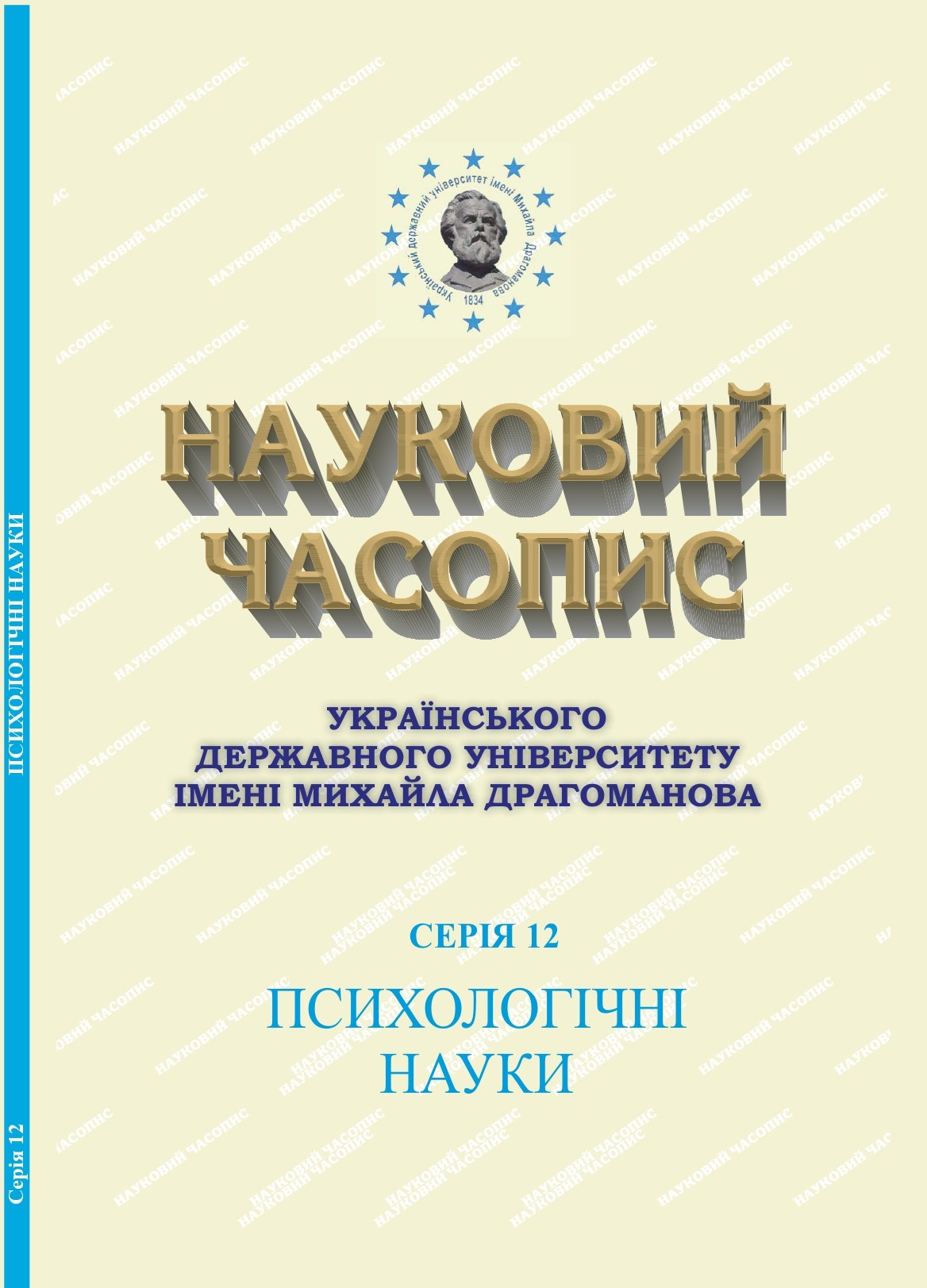RESEARCH OF EMOTIONAL INTELLIGENCE AND MULTICOMMUNICATIVE EMPATHY AS COMPONENTS OF FUTURE TEACHERS’ PERSONAL READINESS TO WORK IN INCLUSIVE EDUCATIONAL SPACE
DOI:
https://doi.org/10.31392/UDU-nc.series12.2023.22(67).09Keywords:
future teacher, readiness to work in an inclusive educational space, personal readiness, emotional intelligence, components of emotional intelligence, empathy.Abstract
Objective. The article outlines the essence of personal readiness of future teachers to work in an inclusive educational space and ensure its quality. Emotional intelligence and empathy are defined by the components of personal readiness. The results of the study of emotional intelligence and multicommunicative empathy as components of personal readiness, in particular components of emotional intelligence, are analyzed: emotional awareness, management of one’s emotions, self-motivation, empathy and recognition of other people’s emotions, as well as the importance of its development for future pedagogical workers, in particular in the conditions of inclusive education. The importance of its development for future teachers in inclusive education is emphasized. The features of the manifestation of high, medium and low levels of partial emotional intelligence revealed in the participants under study are described. In addition, the manifestation of empathy as a scale of emotional intelligence is described in more detail on the basis of the analysis of the results of the diagnosis of the level of multicommunicative empathy according to the scales defined by the methodology: the manifestation of empathy towards parents, animals, elderly people, children, characters of works of art and towards strangers or unfamiliar people. The peculiarities of the manifestation of empathy according to the very high, high, medium, low and very low levels found in the respondents are described. Research methods: theoretical (analysis, systematization and generalization of research results); empirical (methods “Diagnostics of “emotional intelligence” (N. Hall) and “Diagnostics of the level of polycommunicative empathy”). The content of the methods, namely the components of the phenomenon studied, make it possible to assess the ability of future teachers to understand others, expressed in emotions, and manage the emotional sphere on the basis of decision-making. The study involved 365 students of pedagogical specialties (“Primary Education”, “Secondary Education” and “Special Education”) from 16 higher education institutions of Ukraine. Conclusions. According to the specified methods, the predominance of the average level was recorded, which, taking into account the subject of our scientific research, we consider a positive trend. Conclusions have been outlined and prospects for further scientific research have been formed.
References
- Voroshchuk, O.D. (2016). Pidhotovka sotsialnykh pedahohiv do inkliuzyvnoho navchannia ditei z osoblyvymy potrebamy u seredovyshchi zahalnoosvitnoho navchalnoho zakladu [Preparation of social teachers to inclusive education of children with the special necessities in the environment of general educational institutions]. Zbirnyk naukovykh prats Kamianets Podilskoho natsionalnoho universytetu imeni Ivana Ohiienka. Seriia sotsialno-pedahohichna – Collection of Scientific papers Kamianets-Podilskyi National Ivan Ohiienko University. Socio-pedagogical series, 27, 61–71. Retrieved from http://nbuv.gov.ua/UJRN/znpkp_sp_2016_27_9 [in Ukrainian].
- Klopota, Ye.A. (2013). Treninh samopiznannia ta samorozvytku [Self-knowledge and self-development training]. Zaporizhzhia : Zaporizhzhia National University [in Ukrainian]
- Kulyk, N.A., & Hiliova, L.L. (2018). Emotsiinyi intelekt: analiz suchasnykh zakhidnykh doslidzhen [Emotional Intelligence: An Analysis of Contemporary Western Research]. Zbirnyk naukovykh prats K-PNU imeni Ivana Ohiienka, Instytutu psykholohii imeni H.S. Kostiuka NAPN Ukrainy – The Collection of research papers «Problems of Modern Psychology» of Kamianets-Podilskyi National Ivan Ohiienko University and G.S. Kostiuk Institute of Psychology of the National Academy of Educational Sciences of Ukraine, 39, 79–90. Retrieved from https://journals.uran.ua/index.php/2227-6246/article/view/156665/156056 [in Ukrainian].
- Martynchuk, O. V. (2019). Teoriia ta praktyka pidhotovky fakhivtsiv zi spetsialnoi osvity do profesiinoi diialnosti v inkliuzyvnomu osvitnomu seredovyshchi [Theory and practice of training specialists in special education for professional activities in an inclusive educational environment]. Doctor’s thesis. Kyiv [in Ukrainian].
- Rakityanska, L.M. (2019). Emotsiinyi intelekt yak osobystisnyi chynnyk profesiinoho stanovlennia maibutnoho vchytelia [Emotional Intelligence As A Personal Factor In The Prpfessional Formation Of The Future Teacher]. Visnyk Natsionalnoho universytetu «Chernihivskyi kolehium» imeni T. H. Shevchenka. Seriia: Pedahohichni nauky – Bulletin of the T.H. Shevchenko National University “Chernihiv Colehium”. Series: Pedagogical Sciences, 1(157), 162–165. https://doi.org/10.31812/123456789/3279 [in Ukrainian].
- Yaraia, T.A. (2014). Osobystisna hotovnist maibutnikh psykholohiv do profesiinoi diialnosti v umovakh inkliuzyvnoi osvity [Personal readiness of future psychologists for professional activity in conditions of inclusive education]. Extendedabstract of Doctor’s thesis. Kyiv [in Ukrainian].
- Yaroshchuk, K.I. (2022). Profesiino-etychni aspekty pidhotovky maibutnoho pedahoha inkliuzyvnoho osvitnoho zakladu [Professional and ethical aspects of preparing a future teacher of an inclusive educational institution]. Naukovyi chasopys NPU imeni M. P. Drahomanova. Seriia 5. Pedahohichni nauky: realii ta perspektyvy – Scientific journal of M.P. Dragomanov National Pedagogical University. Series 5 Pedagogical Sciences: Realities and Perspectives, 87, 130–133. https://doi.org/10.31392/NPU-nc.series5.2022.87.26
- Arias-Pastor, M., Van Vaerenbergh, S., Fernández-Solana, J., & González-Bernal, J.J. (2023). Secondary Education Teacher Training and Emotional Intelligence: Ingredients for Attention to Diversity in an Inclusive School for All. Education Sciences, 13(5), 1– https://doi.org/10.3390/educsci13050519
- Rajendran, P., Athira, B., & Elavarasi, D. (2020). Teacher Competencies for Inclusive Education: Will Emotional Intelligence do Justice?. Shanlax International Journal of Education, 9(1), 169–182. https://doi.org/10.34293/education.v9i1.3494
- Sanabrias-Moreno, D., Sánchez-Zafra, M. Zagalaz-Sánchez, M.L., & Cachón-Zagalaz, J. (2023). Emotional Intelligence, Quality of Life, and Concern for Gender Perspective in Future Teachers. Sustainability, 15(4), 3640. https://doi.org/10.3390/su15043640
- Valente S. & Lourenço AA. (2022). Editorial: The importance of academic training in emotional intelligence for teachers. Educ., 7, 01–03. https://doi.org/10.3389/feduc.2022.992698

